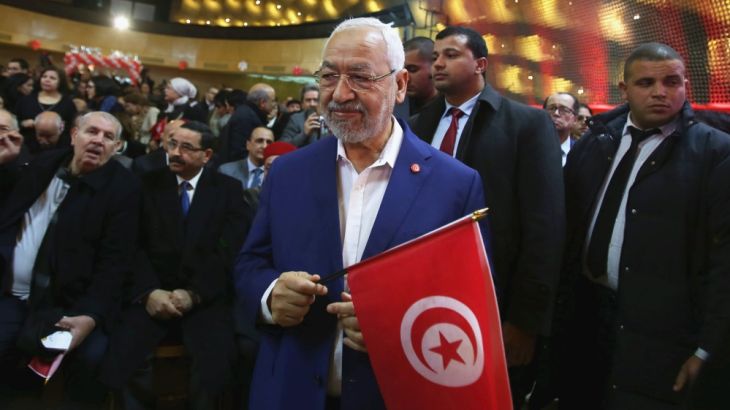Tunisia’s Ennahda distances itself from political Islam
Party leader Rached Ghannouchi calls for more democratic embrace after being labelled “moderate Islamists” for 30 years.

Tunisia’s conservative Ennahda party says it has separated itself from any association with political Islam after being considered “moderate” Islamists for 30 years.
Ennahda’s leader Rached Ghannouchi made the announcement on Friday in the opening of the party’s first congress since 2012, which was attended by thousands of people in the capital, Tunis.
“We are keen to keep religion far from political struggles, and we call for complete neutrality,” he said.
“A modern state is not run through ideologies, big slogans and political wrangling, but rather through practical programmes.”
In 2011, Ennahda won the country’s first democratic election after President Zine El Abidine Ben Ali was forced from power by a popular protest movement.
#Ghannouchi: Freedom does not mean chaos, just as the state’s power does not mean repression and denial of freedoms
— Ennahdha Party (@EnnahdhaParty) May 20, 2016
But in 2014, it came second to the secularist Nidaa Tounes party in parliamentary elections and is part of a coalition government.
Al Jazeera’s Nazanine Moshiri, reporting from Tunis, said that Ennahda’s decision to become more of a democratic party stems from efforts to broaden its appeal to the wider sectors of society.
She said that as a result of its move to halt religious activities in politics, the party’s members can no longer preach in mosques and people can join the party without having to obtain two signatures from the party.
#Ghannouchi: we reaffirm #Ennahdha’s absolute support for the state in its war against ISIS and takfiri extremists#Tunisia
— Ennahdha Party (@EnnahdhaParty) May 20, 2016
“Tunisia and the West in general still view the label of Islamists as connected to groups like Al-Qaeda and Boko Haram. So it is trying to move away from that label, but it doesn’t mean it won’t have Islamic values. It still will.”
Ghannouchi and other intellectuals inspired by Egypt’s Muslim Brotherhood in 1981 founded the Islamic Tendency Movement, which became Ennahda in 1989.
Banned under the leadership of Ben Ali, the party was legalised after the 2011 uprising.
#Ghannouchi: #Ennahdha evolved since the 70s from an ideological movement engaged in the struggle for identity,… https://t.co/uItgWqT3TL
— Ennahdha Party (@EnnahdhaParty) May 20, 2016
Ghannouchi, who lived in exile for 20 years, returned home to a triumphal welcome after the uprising and won post-revolution election in October 2011.